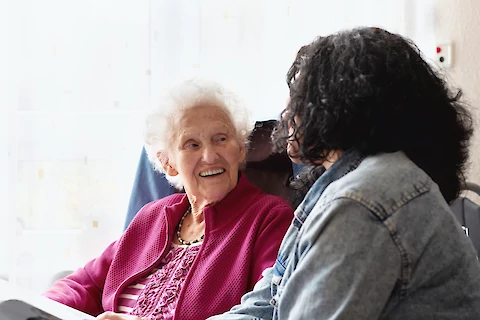
As we navigate the journey of Alzheimer's with our loved ones, there are often unexpected behavioral challenges. Dealing with these changes can be challenging for both the senior and the family caregiver.
Senior Helpers Boston will help you - the family caregiver - understand and manage such behavioral challenges effectively and with compassion while preserving your senior loved one's dignity. We will also delve into essential self-care techniques for you, the caregiver, to prevent stress and burnout.
Understanding Alzheimer's Behavioral Challenges
Alzheimer's disease is a progressive neurological disorder that affects memory, thinking, and behavior. As the disease advances, it often brings about significant behavioral changes in the senior. These may include confusion, agitation, and sometimes aggression. Each of these behaviors presents unique challenges for caregivers.
Confusion, for instance, can lead to repetitive behavior, difficulty understanding time and place, and problems recognizing familiar faces. Agitation often manifests as restlessness, pacing, or anxiety over seemingly minor issues. Although less common, aggression can be physically or verbally expressed, making the caregiving experience particularly stressful.
Strategies for Managing Alzheimer's Behavioral Challenges
Managing these behavioral challenges requires patience, empathy, and specific strategies tailored to each behavior. To manage confusion, simplify the environment, and create routines. Predictability can help reduce stress and anxiety associated with this symptom.
For agitation, identify triggers and figure out ways to prevent or manage them. Simple calming activities like listening to music or walking can be beneficial. When dealing with aggression, remember that it's often driven by fear or frustration rather than malice. Identify the root cause and address it calmly and assertively.
Self-Care for Caregivers
While caring for a loved one with Alzheimer's is a noble act, you, as the caregiver, also need care. High stress levels, emotional fatigue, and lack of self-care can lead to caregiver burnout, which is detrimental to both you and the person you're caring for.
Take regular breaks, engage in activities you enjoy, and maintain a healthy lifestyle. It's not selfish to put your needs first; indeed, it's necessary to continue giving your loved one the best care.
Support Systems for Caregivers
You're not alone on this caregiving journey. Many support systems are available to assist you. Local dementia support groups can provide a sense of community and shared experience. They can be an excellent source of advice, emotional support, and practical tips for those going through similar situations.
Discover Compassionate Senior Care
Managing Alzheimer's behavioral challenges as a caregiver is a challenging task, requiring patience, understanding, and resilience. However, it can be less stressful and more rewarding with the right strategies, support systems, and self-care practices.
If you reside in Boston, Cambridge, West Roxbury, Hyde Park, or Norwood and seek professional support, contact us at Senior Helpers Boston. Our dedicated team is committed to providing personalized, compassionate care to your loved ones while giving you the support you need during this journey.